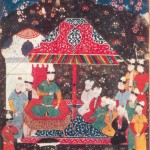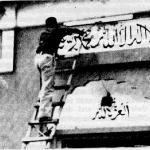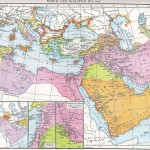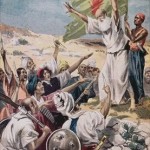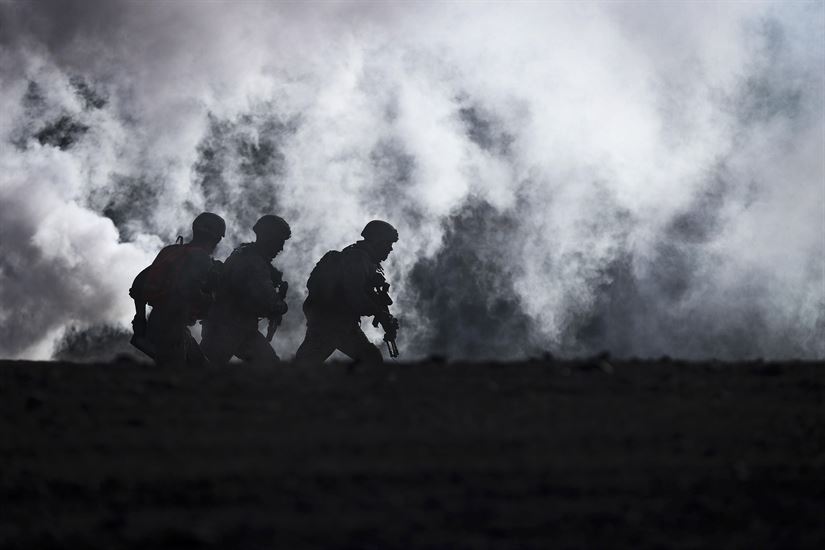
This is the third part of a three-part manuscript tracing the origins of extremist movements within Muslims. The first part dealt with the rivalry between the Ahl-e-Sunnah and the Mutazila and its implications on Islamic jurisprudence. The second part focused on Ibn Taymiyya and the repercussions of his theology and fatwas on the treatment of minorities and sectarian relations. This concluding part examines the circumstances and sociopolitical as well as psychological factors that have contributed to the current picture of religious extremism.
To adequately comprehend political and religious movements it is necessary to examine their history as well their relation to history. There are no historical occurrences that are not a continuation of what came before them. The context of modern history is just as important as the political history of Islam in understanding contemporary religiously themed conflicts.
Following the end of European and Ottoman colonialism a large number of nations came into being or gained independence. In many cases borders were arbitrarily drawn to suit the interests of the retreating colonial masters. This was compounded by the lack of existing political institutions that could facilitate a transition of power to local leadership. As a result wide swathes of South America, the Middle East, Africa and South Asia erupted in internecine conflicts. With few exceptions, a similar pattern followed in all of these regions with the following salient features:
- Democracy was either thwarted completely or repeatedly interrupted and sabotaged by military juntas, e.g. Pakistan, Indonesia, Burma, Nigeria, Rwanda, Sudan, Angola, Somalia, Algeria, Tunisia, Egypt, Libya, Iraq, Syria, Colombia, Venezuela, Guatemala, Honduras etc.
- Civil wars based on ethnic and tribal divisions erupted, e.g. Angola, Pakistan, Sudan, Nigeria, Rwanda, Somalia, Honduras, Colombia, El Salvador, etc.
- Inordinate amounts of national monies were spent on the purchase of arms from Russian, American and European arms manufacturers.
- Massive military aid was received from Western nations e.g. American military aid to the Saddam administration during the Iran-Iraq War, to Pakistan since 1953 and Egypt since Sadat took over after the death of Nasser. It is to be noted that most Western military aid has gone to dictatorial, military and monarchical regimes.
- Repeated purges and crushing of political dissent by autocratic rulers, e.g. Saddam Hussein in Iraq, the Assad dynasty in Syria, Zia-ul-Haq in Pakistan, Omar Al-Bashir in Sudan, Idi Amin in Uganda, Suharto in Indonesia etc.
- Either a courting of or attempt to crush religiopolitical entities. In the case of Pakistan the close association of the military with the Jamaat-e-Islaami and Jamiat-e-Ulema-e-Islam and their patronage of the Afghan Taliban. In the case of Egypt, Tunisia, Algeria, Iraq and Syria the persecution including imprisonment, torture and killing of clergy and their followers. The more extremist elements of the Ikhwan that formed the core of Al Qaeda leadership such as Ayman Al Zwahiri were almost all incarcerated and tortured by the Mubarak regime. In Algeria the refusal of the military establishment to accept the electoral victory of the FIS lead directly to an insurgency that continues to this day.
The seeds of every single major terrorist organization has arisen from countries that were former colonies, where democracy was not allowed to flourish, where autocrats ruled with the proverbial iron fist and whose societies were willfully fractured along religious and ethnic lines.
Where freedom of speech does not exist, where there is no political avenue left open for dissent and where the status quo sets an example of using violence as a means to an end, violence soon becomes the actual expression of political differences.
While the immediate creators of the chaos that has bred terrorism has been the leadership of developing nations, their atrocities have been enabled and magnified by the support- political, financial and military-that they received from Russia, America and Western Europe.
This is the first crucial element to identify in the genesis of modern terrorism: realpolitik. Rich and powerful nations operating supposedly in self-interest, engaging in political sabotage and manipulation and sometimes outright invasion and occupation of weaker nations.
The supreme example of this is the careful construction of a global “Jihad” during the Afghan-Soviet War. The role of the CIA, the Al-Saud regime and Pakistan’s military establishment in funding, arming and indoctrinating an entire generation of Afghans and Pakistanis is well documented and well known.
This war, in fact, is the first instance in the history of Islam of recruits being rallied from all over the globe to participate in a “holy war”. Today, we know that this war provided the most extreme elements within Muslims military and intelligence training from the CIA and the ISI as well as a grand arena to build their enterprise. The importance of the Afghan-Soviet War in creating modern violent extremism cannot be overstated.
What is even more ominous is that national interest no longer represents the interests of the people but instead appears to serve the agenda of political lobbies, especially big money. In the nineteen-fifties United Fruit and Standard Fruit successfully lobbied for American military involvement in Honduras and Guatemala. In 2003, corporations like Blackwater and Halliburton profited obscenely from the Iraq invasion. There is an undeniable element of corporate interest in pro-war camps throughout history.
As we see in Syria today, the efforts of Russia and America in protecting their individual interests in the Middle East have undermined both the effort to fight ISIS as well as the genuine Syrian uprising against Bashar al-Assad. Syria in fact threatens to become another Afghanistan if America and Russia do not put the Syrian people before their political interests.
Let us turn now to how extremist strains within Islam fit into these elements. The example of the Mutazila-Ahl Sunnah rivalry in the first article of this series shows how the lack of tolerance to opposing views can lead to a harshening of ideologies. Whether it is the Abbasid Caliphate and the Mutazila or the regimes of Husni Mubarak and Saddam Hussein, when you attempt to silence dissent through intimidation and violence you are not changing a mindset-you are radicalizing it.
Sisi’s intervention in Egypt for example, and his brutality against supporters of the Muslim Brotherhood will not bode well for the future of Egypt. He is radicalizing another generation of Ikhwan supporters and providing them with more milestones of trauma they will observe each year and use to recruit more followers and stoke more anger.
In the psychological impact of trauma is another confluence of extremism and the other factors mentioned above. Here is an extract from an article I wrote on the subject last year:
The videos and speeches released by Al Qaeda, Al Qaeda in Iraq and ISIS all exemplify this approach. Atrocities committed in Palestine,Chechnya, Iraq and Kashmir featured prominently in the early propaganda videos from Al Qaeda and from Zarqawi. In the case of ISIS, graphic videos of Assad’s bombing campaigns against civilians are juxtaposed with beheadings of westerners and “traitors” with voice overs condemning Western intrusion and Western support for “puppet” leaders in the Arab world. Another extract from the same article:
Another aspect of Volkan’s thesis that appears here are the nihilistic exegeses of Islam proffered by terrorist groups that summon potential recruits to the supposed “original” form of Islam that existed in the religion’s earliest days. Invariably this vision of a pure Islam is tailored to inspire the elements of victimhood, revenge and exaggerated entitlement described by Volkan.
Joseph Campbell used the term “Monomyth” to describe the basic pattern of heroic myths found universally. The narrative of extremists has become the monomyth for many disillusioned, traumatized and indeed sociopathic Muslim youth throughout the world. Starting with “the call to adventure”, trials and tribulations, divine intervention and the attainment of eternal bliss through martyrdom, the terrorist narrative is a textbook example of the hero myth.
And it is religiously themed primarily because the narrative originates in nations where religion is often the only language in which angst and belief can still be expressed; all political expression is rendered ineffectual by tyranny. But secondarily but importantly, also due to the sensationalizing and unrelenting spotlight, whether positive or negative, the media has chosen to shine on “Holy warriors” from the Afghan-Soviet War to the post-9/11 world.
There will be no end to extremism or to terrorism till all of these elements are addressed. Since it is leadership itself that holds power and formulates strategy, the first step towards ending violent extremism will start not with religious reform but with a more capable, less corrupt and more democratic political paradigm.
It is a dangerous and atrociously ignorant stance that many experts in the field have taken-that religious reform is a necessary prerequisite to fight terrorism. The two cannot and must not be conflated. If this garbage becomes national policy the only beneficiaries will be terrorists, dictators and kings.
Religious reform requires a consensus of necessity. It requires willing and able political and religious leadership. In an environment where the leaders of Saudi Arabia and Iran do nothing other than fling insults and accusations at each other, whither religious reform? Religious reform is a societal evolution that requires free debate, legislation and enforcement of that legislation.
Terrorism needs a solution now.
What is thus far lacking from the discourse is political reform and the accountability of leadership that has created extremism and terrorism. For example, a rapprochement between Saudi Arabia and Iran, reconciliation between Sunni and Shia factions in Iraq and an end to the Assad regime in Syria would go a long way in defusing terrorism.
Unless the world ends support for regimes that clamp down on free speech and are intolerant to to dissenting opinion, terrorism will continue to flourish. Instead of invading countries and inviting chaos
Yet, these are not even considered a serious option by the world. To hold those with the actual power to change things responsible for conflict resolution is apparently considered less palatable than this nebulous notion of an Islamic reformation.
Let us rid our discourse of these erroneous, dishonest and failed approaches. To solve a problem one must address the actual agents creating and perpetuating the problem. The divisive narrative of a clash of civilizations, of terrorism being the faithful fulfillment of religious duties must be discarded.
The focus must shift to finding the quickest and most effective way of defeating terrorism and eliminating the elements that create and catalyze it.

